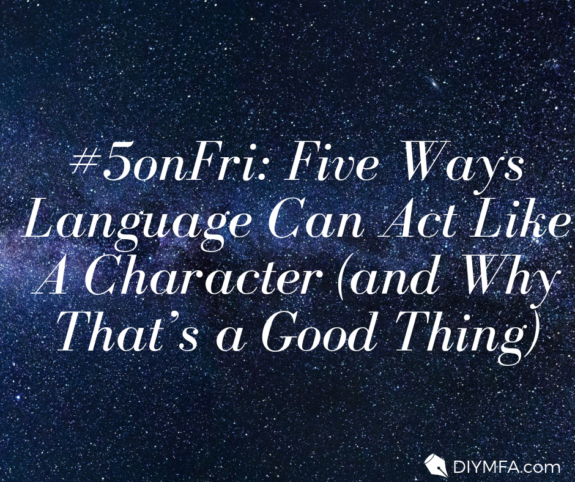When I was out at drinks with a friend a few weeks ago to talk about the first three chapters of my novel I’d sent him, one of the things that kept coming up was the language. Visceral and heavy, paranoid even. These were the words he used to describe it, almost like he was talking about one of my characters. And in a way, he was.
Language, what we say and how we say it, is integral to how we communicate. It can turn what was once an innocent question into a surly accusation, allowing the words on the page to act like a whole other character. With a mood of its own or the ability to elicit strong reactions from readers, our language can give our stories a whole new dimension.
While talking through the portion he’d read, it became clear that my language added a completely different layer to the story. By acting like another one of my characters, born from years of outlining and storyboarding, my language was helping my friend not only empathize with my main character Abigail’s circumstance, but feel it happen to her in real time — experience her unraveling first hand.
As writers it is our duty, to ourselves and our work, to put the best version of our pieces forward. To do that, we may need to lean into the moments where our language manifests as another one of our characters, especially when it’s not working the way we want it to.
Here are five ways language can act like another one of your characters, and why that’s a good thing.
1) It has a mood of its own
The language you use when writing any work can absolutely have its own mood and attitude. Sometimes it’s not the same as your characters’, but even when it is, it’s distinct. As you write, and different tones and inflections bubble up to the surface, try experimenting to see what feels the most natural for the story you’re trying to tell. The same way you did when you first put pen to paper to see how your characters could come to life.
Why it’s good: When your language has its own mood like your characters, readers have the opportunity to be more invested in the piece. They can be provided different perspectives on certain characters or circumstances, and even be warned of things to come.
Writerly example: Mohsin Hamid’s How to Get Filthy Rich in Rising Asia
2) It packs an emotional punch
Whether it’s an enthusiastic “I loved it!” or a vehement “I hated it!” or somewhere right in the middle, everyone has a reaction to what they read. And those reactions typically come about because of the characters or subjects of a piece. But they can also come about because of the writing, which can make us feel icky or awestruck or cause us to second-guess everything around us. In the same way you take care of your characters’ dialogue and actions, try doing so with your word choice and sentence structure.
Why it’s good: Regardless of the story you tell, having language that packs an emotional punch will leave your readers with something to chew on long after the final paragraph.
Writerly example: Janna Levin’s Black Hole Blues and Other Songs from Outer Space
3) It often mirrors the protagonist
Though it may not follow the protagonist all the way through, depending on the point of view, when a work’s language reflects back what is happening to and inside of the main character or others, readers get a deeper sense of what the story is actually about. Like the other characters in your story, there may be a reason the language is following the protagonist. Try experimenting with both mirroring your protagonist and not to see what makes the most sense for your story.
Why it’s good: It allows your work to do double duty. Your story is no longer just a story, but a commentary on a topic that’s important to you — if that’s the intention, of course. For my story, I let my language mirror Abigail so readers can experience her mental deterioration first hand, a crucial element of understanding the why behind the story.
Writerly example: Kate Chopin’s The Awakening
4) It sometimes breaks with convention
I have always been someone who writes how they tell stories, even down to my characters. Though it’s not necessarily how I speak on the regular day-to-day, it is how I perform in front of audiences and how I externally process my ideas with friends and family. I take breaks, I repeat myself, I use sentence fragments. All of it shows up in my writing. Don’t be afraid to try something new or different with yours. Oftentimes characters we create are anything but conventional, so why not extend that same sentiment to our language?
Why it’s good: Seeing pieces of writing that break from the norm is sometimes the very inspiration someone needs to do or think about something differently. And that is perhaps one of the most powerful parts of writing.
Writerly example: Carola Dibbell’s The Only Ones
5) It drives the story
Our characters are the main drivers of our stories, or at least they should be. Their attitudes and decisions are what readers lean on to get a glimpse into their world. Our language can act much the same. Driving the tension and suspense, all the way to the end. When our language, both like and with our characters, drives our stories, they instantly become more compelling. Try using different methods of line breaks, dialogue tags and narrative voices to see what keeps your story going strongest.
Why it’s good: It gives readers the absolute best experience of your story, allowing them to get the full picture of the world you’ve built through more than just the eyes of your protagonist(s).
Writerly example: Tomi Adeyemi’s Children of Blood and Bone
Language is tricky. It’s more than just beautiful words on blank pages, or a navigation tool to get from one end of the story to the other. For readers, it’s a gateway into the very vast and very real worlds we writers create. Which is why it’s good when our language not only acts like another one of our characters, but we treat it as such. Especially if it’s trying to tell us something about how it wants to be crafted. By letting our language take on this other role, we unlock a whole new dimension to our pieces that both deepens our connection to our stories and our readers.
 Jenn Walton is a writer, editor and storyteller based in Washington, D.C. She has drafted and edited sponsored content for top-tier academic institutions, Fortune 500 companies and leading philanthropic organizations that have run in The Washington Post, USA Today and the Atlantic. Her fiction works are housed mainly in the speculative fiction genre, and she is currently working on her first novel project that explores, through the lens of a failing utopia, what happens when those who suffer from mental health issues are neither believed nor empathized with, and are instead othered into non-existence. For more from Jenn, please visit her at her website or on Twitter.
Jenn Walton is a writer, editor and storyteller based in Washington, D.C. She has drafted and edited sponsored content for top-tier academic institutions, Fortune 500 companies and leading philanthropic organizations that have run in The Washington Post, USA Today and the Atlantic. Her fiction works are housed mainly in the speculative fiction genre, and she is currently working on her first novel project that explores, through the lens of a failing utopia, what happens when those who suffer from mental health issues are neither believed nor empathized with, and are instead othered into non-existence. For more from Jenn, please visit her at her website or on Twitter.







